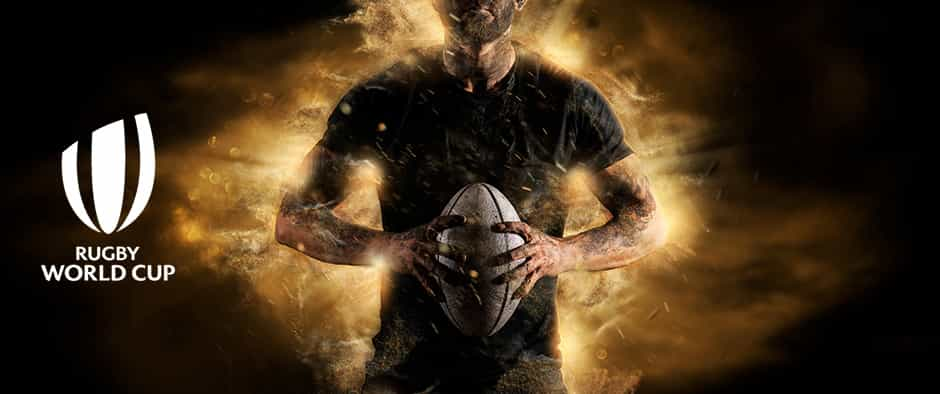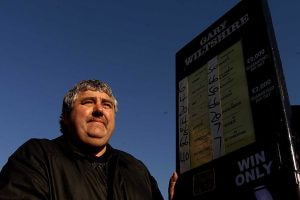Rugby World Cup Winners: Tales of Glory Through the Decades
The Rugby World Cup winners have contributed to the unmatched legacy and longevity of the men’s Rugby World Cup. In this article, we embark on a journey through time, exploring the evolution of this prestigious tournament while staying true to its roots. From remarkable upsets to unforgettable performances by players spanning generations, we delve into every aspect that makes this competition unique. So whether you’re a seasoned rugby enthusiast or simply curious about the unwavering devotion it inspires worldwide, join us for an insider’s look at everything associated with the Men’s Rugby World Cup Winners and the tournament itself.

The men’s Rugby World Cup is the most elite international rugby competition that is held every four years and is incredibly popular with Rugby betting fans who try and predict the identity of the Rugby World Cup winners.
As the global governing body for the sport, World Rugby organises the prestigious tournament. The champion of the competition is awarded the Webb Ellis trophy, named in honour of the man who invented rugby in 1823. Webb Ellis, an English clergyman hailing from Lancashire, is forever enshrined as the sport’s founding father.
The first-ever Rugby World Cup was held in 1987, with two nations, Australia and New Zealand, co-hosting the event. There have been nine editions of the competition so far, with just four countries having the privilege of being crowned Rugby World Cup winners. South Africa and New Zealand have won the competition thrice, Australia twice, and England once.
In the early years, the tournament was contested by sixteen teams till 1995, with the number rising to twenty since the 1999 edition. The most recent tournament was held in Japan, where South Africa were victorious. The next edition is set to be held this year in France.
The current format for 2023 involves twenty teams divided into four pools of five teams each. The team’s selection for the pool depends on the World Ranking in that position; one to four occupy pools A to D in that order, with the remaining spaces filled by qualifiers. Over six weeks, the pool stages are played, followed by the knockout phase contested by eight teams, the winners and runners-up of the four groups.
Rugby World Cup Winners
The Rugby World Cup is undoubtedly one of rugby betting‘s most significant global events that have grown massively in popularity since its inception in 1987. This annual tournament features some of rugby history’s most intense and breath-taking games, such as New Zealand’s sheer dominance on the field or South Africa and Australia emerging victorious on many occasions.
With each passing year comes exciting new opportunities for teams to showcase their skills while providing avid fans unparalleled entertainment. As in many sports, the ultimate reward in rugby is joining the list of rugby world cup winners.
Below we present the Rugby World Cup winners list and a summary of the Rugby World Cup winners list by year.
Rugby World Cup 2019: South Africa’s Triumphant Campaign
The 2019 edition of the World Cup held in Japan was the first-ever tournament played in the Asian continent. The host nation won all their group games, topping their group but was knocked out in the quarter-finals by the eventual Rugby World Cup winners, South Africa, who finished second in pool B. The only defeat in their quest was in the opening group game against eventual Pool B winners New Zealand (23 – 13).
The semi-final was a close encounter, with the Africans triumphing against Wales by three points before their final triumph (32 – 12) against England. The win made South Africa the most successful team in the Rugby World Cup alongside New Zealand. Josh Adams from Wales had the most tries (seven), while South African Handre Pollard was the highest point scorer winning his side sixty-nine points (nine conversions, sixteen penalties and one drop goal).
| Rugby World Cup 2019 Results | ||
|---|---|---|
| Stage | Match | Result |
| Group Stage | New Zealand vs South Africa | 23 – 13 |
| South Africa vs Namibia | 57 – 3 | |
| South Africa vs Italy | 49 – 3 | |
| South Africa vs Canada | 66 – 7 | |
| Quarter-final | Japan vs South Africa | 3 – 26 |
| Semi-finals | Wales vs South Africa | 16 – 19 |
| Finals | England vs South Africa | 12 – 32 |
Rugby World Cup 2015: New Zealand’s Back-to-Back Victory
The eighth edition of the games was played in England, with New Zealand winning to become the first team to retain their title and the first to win a third Rugby World Cup. In addition, Richie McCaw had an individual accolade by becoming the first man to carry the Webb Ellis Cup twice, four years after collecting it on home soil in New Zealand.
The All Blacks defeated great trans-Tasman rivals Australia in the final 34 – 17 at Twickenham, bringing to a close the international careers of both McCaw and fly-half Daniel Carter. New Zealand went unbeaten throughout the tournament, but South Africa gave them the fiercest opposition in the semi-finals, winning by just two points (20 – 18). As a result, England was eliminated in the knockout phase, which was the first time a host nation didn’t make it through the group stage. Nicolas Sanchez scored ninety-seven points, with Julian Savea scoring the most tries (eight), the highest scorers in the categories.
#CapeTown you’ve outdone yourself! #SpringbokTrophyTour #SpringboksTour 😍🏆🇿🇦 pic.twitter.com/c3ymlgswET
— Andile Human (@AndileHuman) November 11, 2019
| Rugby World Cup 2015 Results | ||
|---|---|---|
| Stage | Match | Result |
| Group Stage | New Zealand vs Argentina | 26 – 16 |
| New Zealand vs Namibia | 58 – 14 | |
| New Zealand vs Georgia | 43 – 10 | |
| New Zealand vs Tonga | 47 – 9 | |
| Quarter-finals | New Zealand vs France | 62 – 13 |
| Semi-finals | South Africa vs New Zealand | 18 – 20 |
| Finals | New Zealand vs Australia | 34 – 17 |
Rugby World Cup 2011: All Blacks Triumph on Home Soil
The seventh edition of the games was held in New Zealand, marking a landmark third time the host nation clinched the title after their triumph in 1987 and South Africa (1995). The winners beat France 8 – 7 in a highly contested final after beating them 37 – 17 in the group stage. They won all their games to clinch the title with remarkable dominance, including; a 79 – 15 victory against Canada and an 83 – 7 scoreline against Japan. South Africa’s Morne Steyn was the top scorer with sixty-two points, while England’s Chris Ashton and France’s Vincent Clerc were the top try scorers with six each.
| Rugby World Cup 2011 Results | ||
|---|---|---|
| Stage | Match | Result |
| Group Stage | New Zealand vs Tonga | 41 – 10 |
| New Zealand vs Japan | 83 – 7 | |
| New Zealand vs France | 37 – 17 | |
| New Zealand vs Canada | 79 – 15 | |
| Quarter-finals | New Zealand vs Argentina | 33 – 10 |
| Semi-finals | Australia vs New Zealand | 6 – 20 |
| Finals | France vs New Zealand | 8 – 7 |
Rugby World Cup 2007: South Africa Claims the Crown
South Africa won their second Rugby World Cup title in France to take their tally to two. The Springboks had dominant wins in the group stage, beating England (36 – 0), Samoa (59 – 7), and USA (64 – 5), and the only shacky contest was their (30 – 25) win against Tonga. The Africans continued their dominance in the knockout phase, beating Fiji, Argentina and England in the finals.
The tries at Rugby World Cup 2007 were on another level! 🤩 pic.twitter.com/24HryfLnjq
— Rugby World Cup (@rugbyworldcup) July 24, 2021
| Rugby World Cup 2007 Results | ||
|---|---|---|
| Stage | Match | Result |
| Group Stage | South Africa vs Samoa | 59 – 7 |
| England vs South Africa | 0 – 36 | |
| South Africa vs Tonga | 30 – 25 | |
| South Africa vs USA | 64 – 15 | |
| Quarter-finals | South Africa vs Fiji | 37 – 20 |
| Semi-finals | South Africa vs Argentina | 37 – 13 |
| Finals | England vs South Africa | 6 – 15 |
Rugby World Cup 2003: England Triumphs in Dramatic Fashion
The pre-tournament favourite, England, regarded as the best team in good form, played well to go all the way and win the title. The edition of the games saw some of the highest score margins of teams, with most games ending with a point difference of sixty or more. The record for the most significant winning margin was recorded in the match between Australia and Namibia (142 – 0). England won the group, with their bitter rivals South Africa beating them 25 – 6.
With his cunning tactics earning him acclaim among rugby fans worldwide, Matt Dawson tempted the Australian team into moving offside before delivering an expertly timed pass to Jonny Wilkinson. It was an instant etched forever in history as Wilkinson’s cool-headedness enabled him to nail a near-perfect drop kick with his weaker foot – putting England ahead by three points at 20-17. The team rose spectacularly to the occasion by maintaining their stronghold against their adversaries, ultimately emerging victors and claiming the coveted Rugby World Cup championship.
| Rugby World Cup 2003 | ||
|---|---|---|
| Stage | Match | Result |
| Group Stage | England vs Georgia | 84 – 6 |
| South Africa vs England | 6 – 25 | |
| England vs Samoa | 35 – 22 | |
| England vs Uruguay | 111 – 13 | |
| Quarter-finals | England vs Wales | 28 – 17 |
| Semi-finals | France vs England | 7 – 24 |
| Finals | England vs Australia | 20 – 17 |
Rugby World Cup 1999: Australia Secures Second Title in Wales
The rugby world witnessed another incredible Rugby World Cup event in 1999. The fourth edition of this illustrious tournament took place mainly in Wales, but games were also played across different regions throughout England, Scotland, Ireland and France.
One thing that stood out from previous years’ events was its increased number of participating teams which amounted to twenty instead of sixteen – indicative of a growing global interest in rugby union. The Australian national team, or Wallabies, made headlines by winning the championship after a thrilling journey to get there with impressive performances throughout all stages of the competition.
Their skills and determination were hard to miss, especially when they went up against France at this year’s tournament, where they showcased their exceptional offensive and defensive techniques, leading to an astounding scoreline of 35-12. With this win, Australia secured its second title, making it clear that they could not be excluded from any “significant force” conversations regarding rugby discussions worldwide.
| Rugby World Cup 1999 | ||
|---|---|---|
| Stage | Match | Result |
| Group Stage | Australia vs Romania | 57 – 9 |
| Ireland vs Australia | 3 – 23 | |
| Australia vs USA | 55 – 19 | |
| Quarter-finals | Australia vs Wales | 24 – 9 |
| Semi-finals | South Africa vs Australia | 21 – 27 |
| Finals | Australia vs France | 35 – 12 |
Rugby World Cup 1995: South Africa Triumphs in Historic Home Tournament
The 1995 Rugby World Cup, held in South Africa, was a historic event as it marked the country’s return to international sports after apartheid. The tournament featured 16 teams, including the debut of the South African Springboks.
New Zealand’s Jonah Lomu was a stand-out performer, but the host nation captured the world’s attention. South Africa, led by captain Francois Pienaar, overcame all odds to reach the final and defeat the formidable All Blacks. Joel Stransky’s extra-time drop goal secured their 15-12 victory.
The 1995 Rugby World Cup is remembered not only for its on-field performances but also for its broader significance. South Africa’s victory symbolised hope and unity, with Nelson Mandela’s iconic presentation of the trophy to Pienaar becoming a lasting image of the event.
| Rugby World Cup 1995 | ||
|---|---|---|
| Stage | Match | Result |
| Group Stage | South Africa vs Australia | 27 – 8 |
| South Africa vs Romania | 21 – 8 | |
| South Africa vs Canada | 20 – 0 | |
| Quarter-finals | South Africa vs Western Samoa | 42 – 14 |
| Semi-finals | South Africa vs France | 19 – 15 |
| Finals | South Africa vs New Zealand | 15 – 12 |
Rugby World Cup 1991: Australia Conquers in a Thrilling Championship
The 1991 Rugby World Cup marked an unforgettable chapter for rugby enthusiasts across five nations – England, Ireland, Scotland, Wales and France- who hosted this magnificent event. The contest provided a stage for sixteen teams worldwide to showcase their talent and compete for glory.
England had not previously made it past the semi-finals stage of any previous Rugby World Cup tournament but defied all odds by delivering some awe-inspiring performances.
However, in a fiery showdown against reigning champions Australia at Twickenham Stadium, they lost out with an honourable defeat of 12-6. While it was painful for England, it was joy for Australia as it secured its first Rugby world cup title.
| Rugby World Cup 1991 | ||
|---|---|---|
| Stage | Match | Result |
| Group Stage | Argentina vs Australia | 19 – 32 |
| Australia vs Western Samoa | 9 – 3 | |
| Wales vs Australia | 3 – 38 | |
| Quarter-finals | Australia vs Ireland | 19 – 18 |
| Semi-finals | New Zealand vs Australia | 6 – 16 |
| Finals | England vs Australia | 6 – 12 |
Rugby World Cup 1987: New Zealand Triumphs in Inaugural Tournament
The inaugural World Cup edition was co-hosted between New Zealand and Australia. New Zealand won the tournament beating France 29 – 9 in the final. The competition started with seven teams’ members of the International Rugby Football Board (IRFB), with the other nine nations welcomed to participate. The competition gave the platform for the sport to develop better.
The first-ever Rugby World Cup saw New Zealand’s beloved All Blacks emerge as undisputed champions. Their incredible talent shone through every match leading up to that fateful day when they faced France before thousands watching live at Eden Park stadium in Auckland.
The crowd witnessed the New Zealand team dominate on all fronts – winning by an impressive margin of 29-9 against their challengers – and making history as the first team to become Rugby World Cup winners. This momentous occasion set the stage for an unforgettable journey that would take rugby to even greater heights, captivating sports enthusiasts worldwide.
| Rugby World Cup 1987 | ||
|---|---|---|
| Stage | Match | Result |
| Group Stage | New Zealand vs Italy | 70 – 6 |
| New Zealand vs Fiji | 74 – 13 | |
| New Zealand vs Argentina | 46 – 15 | |
| Quarter-final | New Zealand vs Scotland | 30 – 3 |
| Semi-final | New Zealand vs Wales | 49 – 6 |
| Final | New Zealand vs France | 29 – 9 |
Most Memorable Rugby World Cup Finals
The Rugby World Cup has provided us with several inspiring moments over the previous 28 years, so it should be no surprise that some of the most memorable ones came in the final.
-
England vs Australia (6-12), November 2nd, 1991 – London
England deviated from their successful strategy that took them to the semi-finals against Scotland and the unforgettable quarter-final against France. During the match, the unpredictable full-back David Campese intercepted a ball that could have sent England’s Rory Underwood to score. Australia managed to keep England at bay, with prop Tony Daly scoring from a lineout. Although referee Derek Bevan awarded a penalty to England, converted by Jon Webb, it wasn’t enough to get them back in the game.
-
New Zealand vs Australia (34-17), October 31st, 2015 – London
A thrilling final featuring five tries, two fewer than the combined total of the previous six finals. The match’s outcome was uncertain for most of the second half due to a penalty against All Blacks’ Ben Smith. The Wallabies managed to come back from a 21-3 deficit to 21-17, but New Zealand proved to be the stronger team. Ma’a Nonu and Nehe Milner-Skudder scored tries that secured the victory, making this final one of the best in terms of strong attack rather than weak defence.
-
Australia vs England (17-20, after extra time), November 22nd, 2003 – Sydney
England persevered against the host nation and defending champions for 100 gruelling minutes in torrential rain. Jonny Wilkinson’s drop goal ultimately clinched the win for England. Before Wilkinson’s winning kick, the game saw newcomers score tries, Lote Tuqiri for Australia and Jason Robinson for England. England’s captain, Martin Johnson, lifted the trophy as a true rugby icon, contrasting the four impeccably groomed young men who preceded him. Australian Prime Minister John Howard quickly presented the medals, seemingly eager to move on to other commitments.
Rugby Union World Cup Winners vs Other Rugby Codes
This next section will examine the difference between Rugby Union and the other form of rugby, rugby league.
-
Number of Players
When examining two distinct forms of rugby – Union and League – one factor that stands out as noteworthy is their differing player counts during playtime. Rugby Union sees 15 athletes take to the field for each team during a match, while Rugby League restricts teams to just 13 players apiece. As any fan knows, these disparities profoundly affect each game’s tactical approach and ultimately determine which squad emerges victorious.
-
Tackles and Possession
Rugby Union allows the team with the ball to be tackled without limit while Rugby League implements a “six tackle” policy where the attacking team has six chances to score before conceding possession to their opponents.
-
Scoring System
The point allocation for scoring plays differs between the two codes. In Rugby Union, a try is worth five points, a conversion is two points, a penalty goal is worth three points, and a drop goal also three points. In Rugby League, a try is worth four points, a conversion two points, a penalty goal is also two points, and a drop goal is one point.
-
Rucks and Mauls
Though both sports share similarities such as physicality and strategic gameplay principles, how they handle possession after a tackle sets them apart. Rucks and mauls form when contested balls hit the ground during tackles in Rugby Union. On the other hand, Rugby League’s unique strategy favours quick execution of “play-the-ball” plays: once tackled by an opponent’s defence team member(s), attackers roll possessive balls back by foot to their teammates for better control of gameplay.
-
Lineouts and Scrums
Lineouts in Rugby Union are contested, while in Rugby League, they are replaced by an uncontested scrum. Rugby Union treats its scrums as a crucial element that’s highly contested during matches while adding depth to its style and pace through strategic positioning around them. Conversely, in contrast to this style is that found in Rugby League where such plays hold less value since it serves primarily as a way to restart gameplay.
The differences between these two structures thus provide quite distinctive experiences for fans watching either code.
Rugby World Cup Notable Players and Moments
The Rugby World Cup has enthralled fans with its mix of passion, skill, and unpredictability since its inception while also creating enduring memories through unforgettable players’ performances. These moments showcase what makes rugby such an alluring sport worldwide while making it clear why this competition inspires followers with its sheer excitement.
So whether its shocking upsets or jaw-dropping feats by individuals leading teams to victory after victory in past tournaments, lets take a moment to look back at some stand-out instances that fans will remember forever.
-
Japan’s Unlikely Victory Over South Africa (2015)
One of the most memorable upsets in Rugby World Cup history occurred in 2015 when Japan, considered an underdog, defeated the mighty Springboks. Karne Hesketh’s last-second corner try secured the victory for Japan, causing a stir among fans and leaving the South African team and their supporters in disbelief.
-
Jonah Lomu’s Extraordinary Performance (1995)
All Blacks’ Jonah Lomu, a force to be reckoned with, delivered an outstanding performance in the 1995 Rugby World Cup. Lomu scored three tries in the early games and set up a semi-final showdown against England. He scored four spectacular tries in that match, including a memorable demolishing run where he charged through full-back Catt. Lomu’s prowess left an indelible mark on rugby history. His performance ensured that New Zealand was the Rugby Union World Cup winner
-
Western Samoa’s Shocking Win Over Wales (1991)
In 1991, Western Samoa stunned the rugby world with their unexpected 16-13 victory over Wales, who were the favourites playing at home. Scrum-half Vaea’s kick played a crucial role in the win. Although some may attribute Samoa’s victory to a disputed try in the second half, this match marked the first time an unseeded team had defeated a seeded nation, making it a truly surprising and unforgettable moment in Rugby World Cup history.
Rugby World Cup 2023 – Early Odds
For rugby enthusiasts everywhere, excitement builds as they anticipate the arrival of the sport’s biggest event – the Rugby World Cup. This highly esteemed global championship showcases only the best men’s rugby union teams on a grand stage every four years.
With this year’s dates set from September 8th until October 28th, a fierce battle between top competitors is anticipated.
The likes of New Zealand and South Africa – three-time champions each- will ensure each moment offers non-stop action filled with intense energy, and not surprisingly, they are low odds to be World Cup rugby winners.
“I’d love to see one of the Home Nations win the World Cup, but realistically I think New Zealand will win it. The Irish are in with a shout, and at 4/1 third favourite, the bookies do believe they have a chance.” – Luke Andrews, Betting Expert – UK Market.
While no one can predict with certainty what will happen during this tournament due to team form or injuries, looking at recent history and the odds offered by £10 betting sites and other sportsbooks, it becomes clear which sides are considered favourites.
| Odds of Winning the 2013 Rugby World Cup | |
|---|---|
| Country | Odds |
| France | 11/4 |
| New Zealand | 3/1 |
| Ireland | 4/1 |
| South Africa | 9/2 |
| England | 9/1 |
| Australia | 9/1 |
| Argentina | 28/1 |
| Wales | 28/1 |
| Scotland | 38/1 |
| Japan | 250/1 |
England is priced at 9/1, with bet365 and Wales (28/1) and Scotland (38/1) considered rank outsiders. France is the current favourite and host of the 2023 World Cup.
The 2023 Rugby World Cup broadcast in the UK will be live on ITV, featuring all 48 matches across ITV1, ITV4, and their streaming platform ITVX. This coverage encompasses all Group stage matches, knockout rounds involving England, and the Rugby World Cup Final held at Stade de France on Saturday, October 28th.



